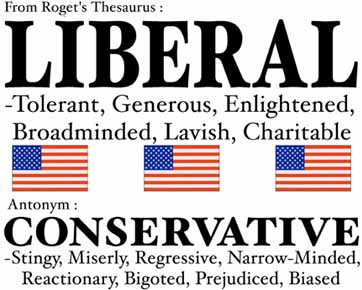 Every week or so I read an article about the historic partisanship of the present day. Rancor between liberals and conservatives is at an all time high. Often the writer will claim partisanship is good: opposing views will be articulated by their strongest advocates. Is that really what happens? Liberals claim that conservatives hate the poor. Conservatives claim that liberals hate the rich. When, in truth, the true hatred isn’t hard to find: liberals and conservatives hate each other.
Every week or so I read an article about the historic partisanship of the present day. Rancor between liberals and conservatives is at an all time high. Often the writer will claim partisanship is good: opposing views will be articulated by their strongest advocates. Is that really what happens? Liberals claim that conservatives hate the poor. Conservatives claim that liberals hate the rich. When, in truth, the true hatred isn’t hard to find: liberals and conservatives hate each other.
We’ve all heard the next line: Aaron Burr shot Alexander Hamilton and Preston Brooks nearly killed Charles Sumner on the floor of the senate in a heated argument over slavery. It’s always been this bad. In an interview with the NYTimes Jonathan Haidt, psychologist and professor in the business school at NYU recently said, “The 1930s through the 1970s was the aberration, a time of extraordinarily low partisanship. In the ’80s, it began to shoot up. The good news is that it can’t get much worse. It’s about as bad as it can possibly get, mathematically, in the House of Representatives.”
What a terrible reason to rationalize hatred: “That’s the way we’ve always done it.”
I found one article that I actually kind of like. It’s written by Michael Laser in the Christian Science Monitor. Laser points (come on now… that’s the best pun I’ve ever come up with), to the most unhealthy and immature part of today’s hyper-partisanship, and through it makes a strong argument for the moderates of both parties:
“[The] list of polar disagreements leaves me with – fittingly – two opposite reactions. The first, more obvious conclusion is that there’s no hope, common ground, or room for compromise. And so nothing will get done in Congress over the next two years.
But these opposing viewpoints also suggest a different idea: Contradictory statements can both be true. Yes, America’s success lies partly in its dynamism and opportunity – and yes, progress requires that we provide for those who have lost their jobs or their health. In other words, if you set your dogma aside, you may find some truth in the ideals of people you’ve always disagreed with.
Which reminds me of something the extreme partisans would prefer we forget: governing in America has happened mainly in the middle zone, between the far left and far right. Yes, the differences are significant and worth negotiating over, but what we’re really talking about is a few percentage points in tax rates, not a choice between socialism and the abolition of all taxes.
In my early Christian life, I was taught to shun paradox and cling to certitude. What a huge mistake. Life only makes sense if we allow paradox, mystery, and wonder to mitigate our sense of certitude. Contradictory statements can both be true. Laser says:
THE CONSERVATIVE VIEW: “People are responsible for themselves – and, given the chance, they’re capable of supporting themselves and their families. If the government makes a practice of providing for people (with welfare, for example), they become dependent and lose their will to work. Nothing could be more destructive to the health of our society.”
THE LIBERAL VIEW: “There are people in this country who struggle to put food on the table or can’t afford medical care. A civilized society would try to help them, instead of leaving them to fend for themselves. (Someday, the one who needs a helping hand may be you, or someone you love.)”
The problem with our society is that most people have lost the ability to say that both statements are true. This is an issue of immaturity. The problem with the U.S. government is that its elected officials don’t really care if both sides are true at the same time, because they are blinded by their hatred for one another. This is horrible immaturity. Laser articulates both sides on a menagerie of issues – it’s well worth your time to read. Here’s hoping that Washington can learn to grow up.












